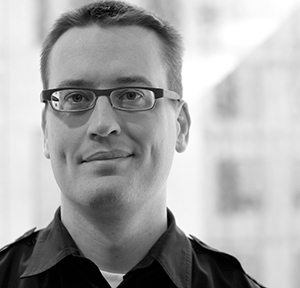The Modern Consciousness:
Jake Byrne in Conversation with
Steve McOrmond

Malahat volunteer Jake Byrne talks with Toronto poet Steve McOrmond about his contribution of four poems to the latest Malahat Summer issue: "We: Source Code," "Night of the Sitcoms," "It Pains Me to Recall," and "Why We Wave at Trains". The poems form part of McOrmond's larger manuscript, Reckon, a collection that tallys our contemporary way of living and what we owe.
Grab your Summer issue today to read McOrmond's poetry!
I hate to ask about pronouns, but reading your newer poems, I was struck by how they differed from those in your most recent full-length collection, The Good News About Armageddon. In that book, the lyric 'I'—the persona at the centre of the long titular poem—demands the reader's attention, even in the face of apocalypse. In three of your four poems featured in the Summer issue of The Malahat Review, you've eschewed the first-person singular pronoun; I've noticed a move towards a more detached method of observation in recent pieces. Is this a deliberate stylistic shift, or a reflection of the subject matter of the new work?
The narrator of that long poem is in the midst of some kind of psychic breakdown. Most of us are pretty good at tuning out the world and holding our fears at arm's length—we have to be in order to survive. But this speaker's filter is damaged. He is no longer able to look away or distance himself from the noise and chaos of current events. So the lyric 'I' of that poem is really a kind of messy collision of the personal and political, a train wreck of different end-times narratives from supermarket tabloids to religious tracts. It's a very self-reflexive, inconsistent and erratic 'I.'
In the new work, I guess you could say the focus shifts toward the collective: What happens when individuals agree to join together and form communities, organizations, tribes, mobs? Does being part of something larger than ourselves mean we must suppress our individuality and self-censor any divergent views? As someone who has worked for corporations and in offices for almost 20 years, I'd have to say yes!
What negotiations are required between self-interest and the goals of a greater good? To what extent are we personally responsible for the past or present actions of our society? These are some of the questions I've been wrestling with in the new manuscript to which these poems belong. Scattered throughout that collection, there is a suite of "We" poems that deliberately adopt the plural personal pronoun to reflect these chafings between the individual and culture.
In The Good News About Armageddon, the book seems to be grappling with problems of intelligibility—the speaker failing to interpret the "lorum ipsum/of frost on the window pane," for example. While "[t]he roll call of extinctions is televised," surrounding the reader is this concatenation of cats lost for words, spores on the air, empty tasseomancy cups. What does your work say about the unsayable?
Anything worth saying is hard to say. It's not easy to make sense of the world; it takes time and concentrated contemplation. The trouble is we don't place much value on contemplation these days, and our busy lives don't leave much time or space for it. We're more apt to rush to judgment, to speak before we think. Witness the inane things that come out of our television sets. Understanding also takes empathy and dialogue to synthesize the ideas and perspectives of others that may be very different from our own. It's a disappointing irony of the web that when we use technologies intended to foster communication and dialogue, we often devolve into tribes and islands of answering. So, yeah, to quote the prison warden in Cool Hand Luke, the Paul Newman film, "What we've got here is a failure to communicate."
Tell us about your new manuscript. What is being reckoned?
The poems that appear in The Malahat Review are all part of a new manuscript with the working title Reckon. In ye olde English pubs, the bill at the end of the night was called the reckoning. And many of the new poems attempt to tally the cost of our contemporary way of living and what we owe. In this sense, you could say the new collection picks up where my last book left off. But there's another sense of reckoning too: To go figure. There is, I'd like to believe, a hard-earned hopefulness in many of these new poems that if we recognize our current way of life as untenable and apply our formidable intelligence to the challenges at hand, together we can make the changes necessary to avoid destroying the world and ourselves.
Part of that recognition involves going back and looking at the origins of our structures and systems which have become forces to be reckoned with. The global economy, governments, corporations—we made these things but they no longer serve us. We used to wonder how God's grace could be so unequal in its dispensation. Now in the secular world, we wonder the same thing about the economy: It's an inequality engine so absurd and fragile in its design that it can only be a reflection of its makers' deepest flaws and vulnerabilities. We need to understand those innate flaws, where they came from and how they've manifested themselves across time.
One friend has described the new collection as plumbing the "chilly digital realms" where many of us spend an increasing number of hours. We or our avatars now inhabit many virtual realities. The new work considers how this complicates our ability to distinguish between what is real and what is not, and what this might mean for our relationships with each other and with the natural world. Despite ourselves, we are still entirely dependent on both, so we better get it right!
I'm struck by how delicately and how often your work manages its code-switching. By this I mean the shift from tender to snarling, scathing to earnest, often in the span of a line or two. Is there anything about your compositional process that you credit to your ability to shift register?
Well, I wouldn't rule out some degree of undiagnosed and self-medicated manic-depression! That said, I've been influenced by a number of poets who employ rapid-fire shifts in tone and register. John Ashbery, John Berryman, Ron Silliman and Rae Armantrout are a few that come to mind. I've also chosen to live in Toronto, a frenetic urban environment where there's always a lot happening all at once. Often I'm assembling fragments of dialogue I've overheard on the subway ("I need an invisible tongue ring") and juxtaposing them with other found material lifted from graffiti ("We are all Wal-Mart"), chalkboard signage ("Come on in, specials all weak"), you name it. I'm really just trying to reflect the simultaneity and many-voicedness of the modern world—and the modern consciousness—as accurately as I can.
In "We: Source Code," you write "[o]nce we had words, we sent them/on ahead of us to the four corners/and what we wrote was: Yield". Does poetry ask the world to yield to it? What is the role of the poet is in an age of extinction? Doomsayer, or glorifier?
Maybe it's that poetry asks readers to yield to it, whereas so much of the prosaic language we transact in the world demands that we do. I'm thinking of signage that tells us not to trespass on private property or the barrage of advertising we're exposed to every day that means to trigger our latent fears ("Got odour?") and induce us to buy. Language is used to shout, command, enforce, instruct, influence, tell us what to do and what to desire. In contrast, poetry's peculiar strength and resilience may lie in its quietness; it listens rather than raising its voice and questions as much or more than it asserts. There's a tendency in our culture to equate quietness with passivity, but that's false. In her poem "Butterfly Bones; or Sonnet Against Sonnets," Margaret Avison describes the insect's, or poem's, "fierce listening," which suggests just how radical, subversive and dangerous a poetics of quiet contemplation and attention can be. So perhaps the role of the poet is simply to listen, to attend, to show up and pay attention.

Jake Byrne
* * * * * * * *









